Related Research Articles
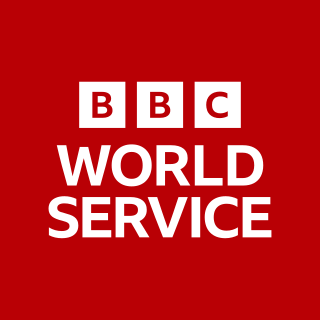
The BBC World Service is an international broadcaster owned and operated by the BBC. It is the world's largest external broadcaster in terms of reception area, language selection and audience reach. It broadcasts radio news, speech and discussions in more than 40 languages to many parts of the world on analogue and digital shortwave platforms, internet streaming, podcasting, satellite, DAB, FM and MW relays. In 2015, the World Service reached an average of 210 million people a week. In November 2016, the BBC announced that it would start broadcasting in additional languages including Amharic and Igbo, in its biggest expansion since the 1940s.

BBC Radio 4 is a British national radio station owned and operated by the BBC. Officially opened on 14 November 1922 as 2LO London, it broadcasts a wide variety of spoken-word programmes, including news, drama, comedy, science and history from the BBC's headquarters at Broadcasting House, London. The station controller is Mohit Bakaya.

Freeview is the United Kingdom's sole digital terrestrial television platform. It is operated by Everyone TV and DTV Services Ltd, a joint venture between the BBC, ITV, Channel 4, Channel 5 and Sky. It was launched on 30 October 2002, taking over the licence from ITV Digital which collapsed that year. The service provides consumer access via an aerial to the seven DTT multiplexes covering the United Kingdom. As of July 2020, it has 85 TV channels, 26 digital radio channels, 10 HD channels, six text services, 11 streamed channels, and one interactive channel.

BBC Radio is an operational business division and service of the state media outlet British Broadcasting Corporation. The service provides national radio stations covering the majority of musical genres, as well as local radio stations covering local news, affairs and interests. It also oversees online audio content.
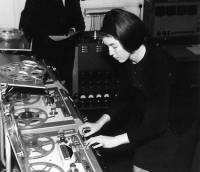
Delia Ann Derbyshire was an English musician and composer of electronic music. She carried out notable work with the BBC Radiophonic Workshop during the 1960s, including her electronic arrangement of the theme music to the British science-fiction television series Doctor Who. She has been referred to as "the unsung heroine of British electronic music", having influenced musicians including Aphex Twin, the Chemical Brothers and Paul Hartnoll of Orbital.
Desert Island Discs is a radio programme broadcast on BBC Radio 4. It was first broadcast on the BBC Forces Programme on 29 January 1942.

Anthony Kenneth Blackburn is an English disc jockey, singer and TV presenter.

BBC Radio 3 is a British national radio station owned and operated by the BBC. It replaced the BBC Third Programme in 1967 and broadcasts classical music and opera, with jazz, world music, drama, culture and the arts also featuring. The station describes itself as "the world's most significant commissioner of new music", and through its New Generation Artists scheme promotes young musicians of all nationalities. The station broadcasts the BBC Proms concerts, live and in full, each summer in addition to performances by the BBC Orchestras and Singers. There are regular productions of both classic plays and newly commissioned drama.

BBC Four is a British free-to-air public broadcast television channel owned and operated by the BBC. It was launched on 2 March 2002 and shows a wide variety of programmes including arts, documentaries, music, international film and drama, and current affairs. It is required by its licence to air at least 100 hours of new arts and music programmes, 110 hours of new factual programmes, and to premiere twenty foreign films each year. The channel broadcasts daily from 7:00 pm to 4:00 am, timesharing with CBeebies.

Gilles Jérôme Moehrle MBE, better known as Gilles Peterson, is a French broadcaster, DJ, and record label owner. He founded the influential labels Acid Jazz and Talkin' Loud, and started his current label Brownswood Recordings in 2006. He was awarded an honorary MBE in 2004, the AIM Award for Indie Champion and the Mixmag Award for Outstanding Contribution To Dance Music in 2013, the PRS for Music Award for Outstanding Contribution to Music Radio in 2014, and The A&R Award from the Music Producers Guild in 2019.

BBC Online, formerly known as BBCi, is the BBC's online service. It is a large network of websites including such high-profile sites as BBC News and Sport, the on-demand video and radio services branded BBC iPlayer and BBC Sounds, the children's sites CBBC and CBeebies, and learning services such as Bitesize and Own It. The BBC has had an online presence supporting its TV and radio programmes and web-only initiatives since April 1994, but did not launch officially until 28 April 1997, following government approval to fund it by TV licence fee revenue as a service in its own right. Throughout its history, the online plans of the BBC have been subject to competition and complaint from its commercial rivals, which has resulted in various public consultations and government reviews to investigate their claims that its large presence and public funding distorts the UK market.

Cerys Matthews is a Welsh singer, songwriter, author, and broadcaster. She was a founding member of Welsh rock band Catatonia and a leading figure in the "Cool Cymru" movement of the late 1990s.
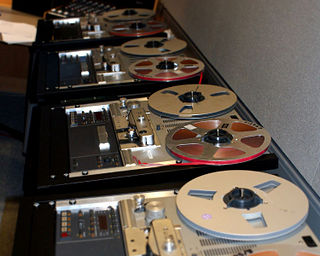
The British Library Sound Archive, formerly the British Institute of Recorded Sound; also known as the National Sound Archive (NSA), in London, England is among the largest collections of recorded sound in the world, including music, spoken word and ambient recordings. It holds more than six million recordings, including over a million discs and 200,000 tapes. These include commercial record releases, radio broadcasts, and privately made recordings.
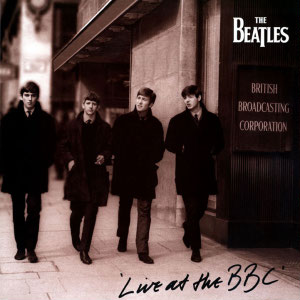
Live at the BBC is a 1994 compilation album featuring performances by the Beatles that were originally broadcast on various BBC Light Programme radio shows from 1963 to 1965. The mono album, available in multiple formats but most commonly as a two-CD set, consists of 56 songs and 13 tracks of dialogue; 30 of the songs had never been issued previously by the Beatles. It was the first official release by the Beatles of previously unreleased performances since The Beatles at the Hollywood Bowl in 1977 and the first containing previously unreleased songs since their final studio album, Let It Be, in 1970.

Maida Vale Studios is a complex of seven BBC sound studios, of which five are in regular use, in Delaware Road, Maida Vale, west London.
The British Broadcasting Corporation (BBC) is a British public service broadcaster headquartered at the Broadcasting House in London, originally established in 1922 as the British Broadcasting Company and evolved into its current state with its current name on New Year's Day 1927. The oldest and largest local and global broadcaster by stature and by number of employees, it employs over 21,000 staff in total, of whom approximately 17,900 are in public-sector broadcasting.
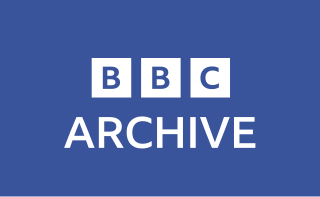
BBC Archives are collections documenting the BBC's broadcasting history, including copies of television and radio broadcasts, internal documents, photographs, online content, sheet music, commercially available music, BBC products, press cuttings, artifacts and historic equipment. The original contents of the collections are permanently retained but are in the process of being digitised. Some collections are being uploaded to the BBC Archives section of the BBC Online website for visitors to view. The archive is one of the largest broadcast archives in the world, with over 15 million items.
Marie Tapscott Slocombe (1912–1995) founded the BBC Sound Archive in 1936. Her keen interest in audio recordings and folk music have made her legacy important in the history of recorded sound.

Kermode and Mayo's Film Review was a radio programme with Mark Kermode and Simon Mayo, broadcast on BBC Radio 5 Live on Friday afternoons. The show was self-described as the BBC's "flagship film programme" and featured film reviews from Kermode, interviews with actors and other guests, and listeners' emails. The programme's Twitter handle, "Wittertainment", was a nickname for the programme itself.
'Unlocking Our Sound Heritage' (UOSH) is a UK-wide project that aims to preserve, digitise and provide public access to a large part of the nation's sound heritage. The UOSH project forms part of the core programme 'Save Our Sounds' led by the British Library and involving a consortium of ten regional and national archival institutions. Between 2017 and 2022 the aim is to digitise and make available up to 500,000 rare and unique sounds recordings, not only from the British Library's collection but from across the UK, dating from the birth of recorded sound in the 1880s to the present time. The recordings include sounds such as local dialects and accents, oral histories, previously inaccessible musical performances and plays, and rare wildlife sounds. The consortium will also deliver various public engagement programmes, and a website where up to 100,000 recordings will be freely available to everyone for research, enjoyment and inspiration.
References
- ↑ "BBC Archive - The BBC Sound Archive". www.bbc.co.uk. Retrieved 15 February 2010.
- 1 2 3 "Saving the sounds of history". BBC News. 30 August 2007. Retrieved 15 February 2010.
- ↑ "Planned Environment Therapy Trust Archive and Study Centre. Publications by Staff. Craig Fees, "Appreciation [Marie Slocombe, 1912-1995]" FOLK MUSIC JOURNAL (1996), pp. 272-273". www.pettarchiv.org.uk. Archived from the original on 5 September 2008. Retrieved 15 February 2010.
- ↑ "BBC - BBC Internet Blog: Pioneers of the BBC Sound Archive". www.bbc.co.uk. Archived from the original on 10 February 2010. Retrieved 15 February 2010.
- ↑ "BBC Archive - Preserving the Sound Archive". www.bbc.co.uk. Retrieved 16 February 2010.
- ↑ "The Archive Hour". www.radiolistings.co.uk. Archived from the original on 7 January 2013. Retrieved 15 February 2010.
- ↑ "Spoken Word Services » Blog Archive » BBC Archive trial takes off". www.spokenword.ac.uk. Archived from the original on 1 January 2011. Retrieved 15 February 2010.
- ↑ "BBC Archive - The BBC Sound Archive". www.bbc.co.uk. Retrieved 16 February 2010.
- ↑ "BBC Archive - The BBC Television Archive". www.bbc.co.uk. Archived from the original on 13 February 2010. Retrieved 16 February 2010.
- ↑ "BBC Sound Archive — SSRC". mediaresearchhub.ssrc.org. Archived from the original on 23 April 2009. Retrieved 15 February 2010.
- ↑ "Using the Sound Archive catalogue". www.bl.uk. Archived from the original on 15 January 2010. Retrieved 15 February 2010.
- ↑ "BBC Archive - Preserving the Sound Archive". www.bbc.co.uk. Retrieved 16 February 2010.
- ↑ "BBC Archive - Preserving the Sound Archive". www.bbc.co.uk. Retrieved 16 February 2010.